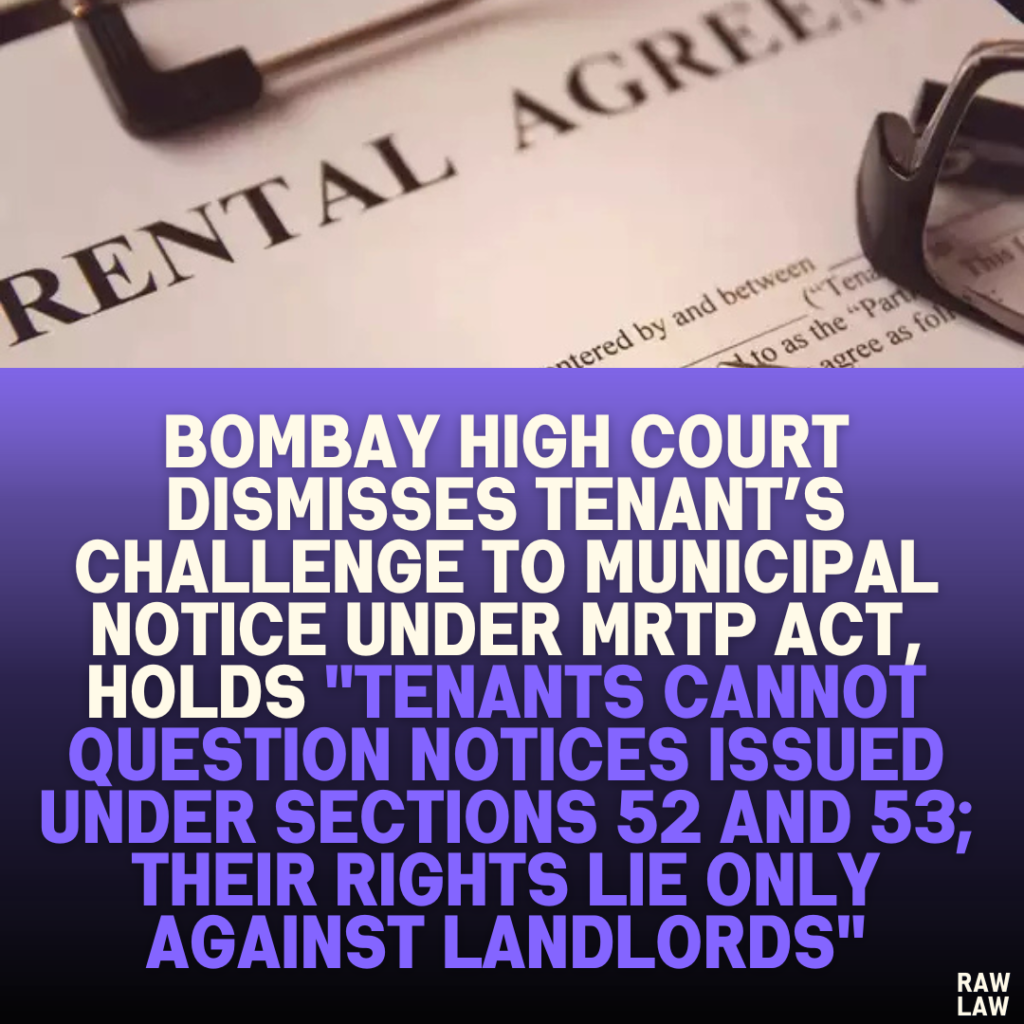Court’s Decision
The Bombay High Court dismissed a writ petition filed under Articles 226 and 227 of the Constitution of India, holding that a tenant cannot challenge a notice issued under Sections 52 and 53 of the Maharashtra Regional Town Planning (MRTP) Act. The court emphasized that a tenant’s rights, if any, lie solely against their landlord and cannot extend to challenging the municipal corporation’s notices. The court stated, “We are unable to determine and protect the rights of a tenant qua the subject property in the writ jurisdiction.”
Facts
- The petitioner is a 70-year-old businessman and tenant of a structure known as Hotel Pritam, located on Plot No. 96A, Sangmeshwar Mosampool, Malegaon, Nashik.
- The petitioner claimed tenancy rights based on:
- A rent agreement dated August 1, 1983.
- A Food and Safety license issued on December 15, 2016, under the Food Safety and Standards Act, 2006.
- Electricity bills for the property.
- The structure was constructed with permission granted by the Malegaon Municipal Corporation in an order dated July 28, 1980, and an approved plan was annexed to the petition.
- A notice was issued by the Malegaon Municipal Corporation on October 23, 2020, under Sections 52 and 53 of the MRTP Act, addressing alleged unauthorized construction. The petitioner argued this notice was issued at the behest of the landlord, who intended to evict him.
- The petitioner alleged mala fide intentions and arbitrariness in the issuance of the notice, further arguing that his reply to the notice (dated November 7, 2020) was not considered.
Issues
- Whether a tenant of a structure can legally challenge a notice issued under Sections 52 and 53 of the MRTP Act.
- Whether the petitioner’s rights under tenancy law can override the corporation’s authority under the MRTP Act.
Petitioner’s Arguments
- The petitioner asserted that the structure in question was lawful, built in compliance with municipal approvals from 1980, and maintained valid tenancy.
- The notice issued by the Malegaon Municipal Corporation was allegedly arbitrary, motivated by the landlord’s desire to evict the petitioner, and not issued in good faith.
- The petitioner argued that he cannot be evicted without due process of law, referring to an order passed by the Civil Judge, Junior Division, Malegaon, in 2014, which upheld the requirement for lawful eviction procedures.
Respondent’s Arguments
- The respondents maintained that the MRTP Act provides authority to municipal corporations to issue notices concerning unauthorized structures, and only the property owner (landlord) has the standing to challenge such notices.
- The respondents argued that the petitioner, as a tenant, had no locus standi to contest the notice under the MRTP Act.
Analysis of the Law
- Sections 52 and 53 of the MRTP Act:
- Section 52 empowers planning authorities to address unauthorized development or construction.
- Section 53 provides for the issuance of notices for the removal of unauthorized constructions.
- These provisions focus on the property owner’s responsibilities and do not explicitly grant tenants the right to contest such notices.
- The petitioner’s reliance on tenancy agreements, licenses, and electricity bills demonstrates tenancy rights but does not invalidate the corporation’s authority under these statutory provisions.
Precedent Analysis
- Anandrao G. Pawar v. Municipal Corporation of Greater Mumbai (2023 SCC OnLine Bom 2534):
- A tenant cannot contest demolition or eviction notices under the MRTP Act.
- Tenants must assert their rights against landlords in civil court.
- Shaha Ratansi Khimji and Sons v. Kumbhar Sons Hotel Pvt. Ltd. (2014) 14 SCC 1:
- The Supreme Court held that even if a tenanted building is demolished, tenancy rights are not extinguished. Tenants can claim rights to reconstructed premises, provided the landlord complies with statutory obligations.
Court’s Reasoning
- The court held that a tenant does not have the legal right to challenge notices issued under the MRTP Act, as the statutory framework addresses property ownership issues rather than tenancy disputes.
- The court clarified that the petitioner’s rights, if any, lie against the landlord and not the municipal corporation. It stated, “The tenant’s rights are protected by statute, and remedies lie in the jurisdictional civil court.”
- The court referred to established precedents, emphasizing that tenancy rights are unaffected by demolition or reconstruction but must be asserted through appropriate legal channels, not by challenging notices in writ jurisdiction.
Conclusion
The petition was dismissed, with the court concluding that:
- The petitioner has no locus standi to challenge the MRTP Act notices.
- The petitioner may pursue remedies against the landlord in civil court to assert tenancy rights.
- The court reiterated that writ jurisdiction cannot be invoked to adjudicate tenancy disputes or interfere with municipal notices issued under the MRTP Act.
Implications
- Clarity on Tenants’ Rights: The judgment reinforces that tenants cannot bypass statutory procedures or challenge municipal notices directly. Their rights must be pursued against landlords in civil court.
- Limited Scope of Writ Jurisdiction: The ruling underscores that the High Court’s writ jurisdiction is not a substitute for statutory remedies available under tenancy or municipal laws.
- Statutory Protection of Tenancy Rights: Tenants retain statutory protection and may reclaim premises or compensation under tenancy laws, even after demolition, if the landlord fails to reconstruct.
This judgment sets a strong precedent on the limitations of tenants’ rights concerning municipal notices and highlights the appropriate legal remedies available to them.




Pingback: Delhi High Court Denies Bail to Gang Leader Accused of Double Murder: Prolonged Incarceration Outweighed by Criminal Antecedents and Societal Safety Concerns - Raw Law
Pingback: Delhi High Court Upholds DDA’s Decision to Reschedule E-Auction Due to Technical Glitches, Rejects Claim of Arbitrariness by Highest Bidder; Emphasizes "Fair Participation and Public Interest Take Precedence Over Procedural Rigidity" - Raw Law